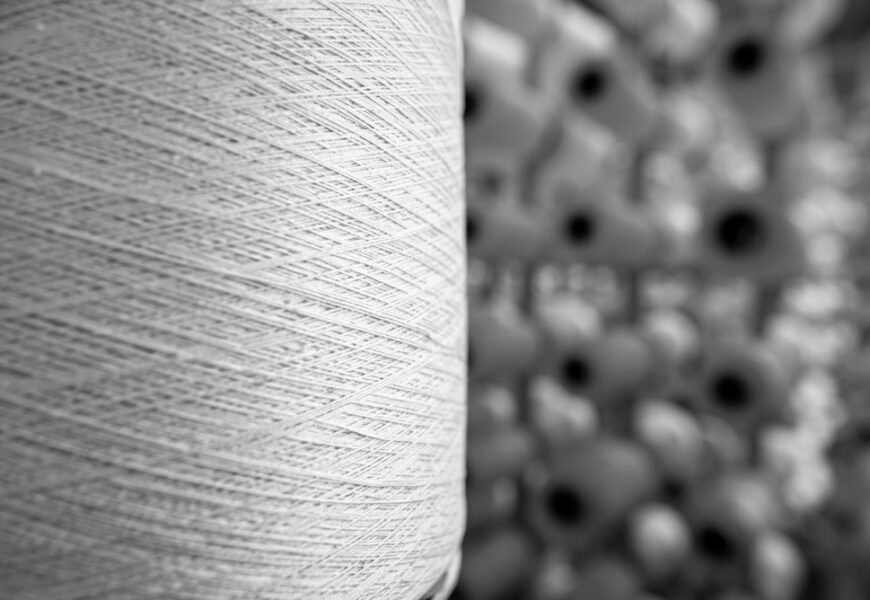Polyester yarn is a versatile and widely used textile material, but not all polyester yarns are created equal. There are two primary types – spun and filament – each with distinct characteristics and applications. Spun polyester yarn is made from short fibers that are twisted together, while filament polyester yarn is composed of continuous, long fibers. This fundamental difference leads to variations in their properties, such as strength, texture, and drape. Understanding the differences between spun and filament polyester yarn is crucial for selecting the right fabric for various purposes, from clothing to home textiles and industrial applications. Let’s explore the key distinctions between these two types of polyester yarn and discover how they impact the final product.
What Is Polyester Yarn?
Polyester yarn is a synthetic fiber derived from petroleum-based products, specifically ethylene glycol and terephthalic acid. It’s known for its durability, resistance to shrinking and stretching, and ability to retain color. Polyester yarn is used in various applications, from clothing and home textiles to industrial products. However, polyester yarn comes in two primary types: spun and filament, each with distinct characteristics and uses.
How Is Filament Polyester Yarn Made?
Filament polyester yarn is produced directly from the polymerization process where the molten polymer is extruded through a spinneret, creating continuous filaments. These filaments are then cooled and wound onto spools without further processing. Filament yarns can be either monofilament, consisting of a single filament, or multifilament, made up of multiple filaments twisted together.
Key Characteristics of Filament Polyester Yarn:
- Smooth and Lustrous: Filament yarns have a smooth surface and a shiny appearance, making them ideal for applications requiring a glossy finish.
- High Strength: The continuous nature of the filaments provides high tensile strength, making filament yarn suitable for heavy-duty textiles and industrial applications.
- Low Pilling: Filament yarns are less prone to pilling, which occurs when fibers break and tangle on the surface of the fabric.
What Is Spun Polyester Yarn?
Spun polyester yarn is made by first creating staple fibers, which are short lengths of polyester, typically ranging from 1 to 4 inches. These staple fibers are then spun together, much like cotton or wool, to form a yarn. The spinning process twists the fibers together, giving the yarn its structure and strength.
Key Characteristics of Spun Polyester Yarn:
- Soft and Textured: Spun yarn has a soft, textured surface that mimics the feel of natural fibers like cotton or wool, making it comfortable to wear.
- Matte Finish: Unlike filament yarn, spun polyester has a matte appearance, which is often preferred for casual and everyday wear.
- Higher Pilling: Due to the shorter fibers used in spun yarn, it is more susceptible to pilling compared to filament yarn.
What Are the Primary Differences Between Spun and Filament Polyester Yarn?
Understanding the fundamental differences between spun and filament polyester yarn can help you choose the right material for your textile project. Here’s a comparison:
Texture and Feel:
- Spun Yarn: Feels softer and more natural, similar to cotton, making it ideal for garments that require comfort.
- Filament Yarn: Has a smooth, silky texture, providing a sleek and modern feel, perfect for formal wear and high-performance textiles.
Appearance:
- Spun Yarn: Offers a matte finish, which is less reflective and more understated, suitable for casual and traditional styles.
- Filament Yarn: Provides a glossy, shiny finish, adding elegance and sophistication to garments and textiles.
Strength and Durability:
- Spun Yarn: While strong, it is generally less durable than filament yarn, especially in heavy-duty applications.
- Filament Yarn: Known for its high tensile strength and durability, making it the better choice for industrial and performance applications.
Pilling Resistance:
- Spun Yarn: More prone to pilling, especially in areas subject to friction, such as underarms or seat cushions.
- Filament Yarn: Less likely to pill due to its continuous filament structure, maintaining a smooth surface over time.
What Are the Applications of Spun Polyester Yarn?
Spun polyester yarn is widely used in applications where comfort and a natural feel are important. These include:
Apparel:
- Casual Wear: T-shirts, sweatshirts, and casual dresses made from spun polyester offer comfort and breathability.
- Uniforms: Spun polyester is popular in uniforms, providing a balance of durability and comfort for everyday wear.
Home Textiles:
- Bedding: Sheets, pillowcases, and duvet covers made from spun polyester provide a soft and cozy sleeping experience.
- Upholstery: Used in cushions and upholstery, spun polyester offers a textured finish that mimics natural fibers.
Crafts and DIY Projects:
- Knitting and Crocheting: Hobbyists prefer spun polyester for its ease of use and the natural feel it provides in finished products.
- Embroidery: The matte finish of spun polyester yarn makes it a popular choice for embroidery projects requiring a subtle appearance.
What Are the Applications of Filament Polyester Yarn?
Filament polyester yarn is favored in applications requiring strength, durability, and a sleek appearance. Common uses include:
Performance Wear:
- Sportswear: Filament polyester is ideal for sportswear due to its moisture-wicking properties and smooth finish.
- Swimwear: The strength and water resistance of filament polyester make it perfect for swimwear and activewear.
Industrial Textiles:
- Ropes and Cords: Filament polyester is used in ropes, cords, and other industrial textiles where strength is crucial.
- Tire Cords: Filament yarn is used in the production of tire cords, providing the necessary strength and durability for automotive applications.
Fashion and Luxury Textiles:
- Evening Wear: The glossy finish of filament polyester is ideal for evening gowns and formal wear.
- Home Decor: Drapes, curtains, and upholstery made from filament polyester add a touch of elegance to home interiors.
How Do You Choose the Right Polyester Yarn for Your Project?
Choosing between spun and filament polyester yarn depends on the specific requirements of your project. Consider the following factors:
Comfort vs. Durability:
- For products where comfort is paramount, such as casual wear or bedding, spun polyester is the better choice.
- If durability and strength are more important, especially in performance wear or industrial textiles, filament polyester is the way to go.
Appearance:
- If you want a matte, understated look, opt for spun polyester.
- For a shiny, elegant finish, filament polyester will provide the desired effect.
Pilling Resistance:
- Consider filament polyester if pilling is a concern, especially for garments and textiles subject to frequent use.
How Does Avon Commercial Meet Your Polyester Yarn Needs?
Avon Commercial is a leading polyester yarn supplier in Pakistan, offering a wide range of high-quality spun and filament polyester yarns to meet diverse industry needs. Here’s how Avon Commercial supports your polyester yarn requirements:
- Quality Assurance: Avon Commercial ensures consistent quality across all its polyester yarn products, providing reliable performance in every application.
- Technical Expertise: With extensive knowledge of polyester yarn properties and applications, Avon Commercial offers expert guidance to help you select the right yarn for your project.
- Customization: Avon Commercial offers customized polyester yarn solutions, including specific blends, colors, and finishes, tailored to your unique needs.
- Supply Chain Reliability: With a robust supply chain network, Avon Commercial ensures timely delivery of polyester yarn products, helping you maintain production schedules and meet market demands.
- Environmental Responsibility: Avon Commercial is committed to sustainable practices, offering eco-friendly polyester yarn options that reduce environmental impact.
Why Choose Avon Commercial as Your Polyester Yarn Supplier in Pakistan?
Choosing the right yarn supplier in Pakistan is crucial for ensuring the success of your textile projects. Avon Commercial stands out as a trusted polyester yarn supplier, providing high-quality products, exceptional customer service, and industry expertise. Whether you need spun or filament polyester yarn, Avon Commercial offers the best solutions to meet your needs, ensuring that your products are both high-performing and market-ready.
Wrapping Up: The Importance of Understanding Polyester Yarn Differences
Understanding the differences between spun and filament polyester yarn is essential for selecting the right material for your textile projects. Each type of yarn offers unique properties that make it suitable for specific applications. As a leading polyester yarn supplier in Pakistan, Avon Commercial provides high-quality spun and filament polyester yarns, helping you achieve the perfect balance of comfort, durability, and aesthetics in your products.
Don’t miss out on the upcoming news about Tribunaldotrabalho!











